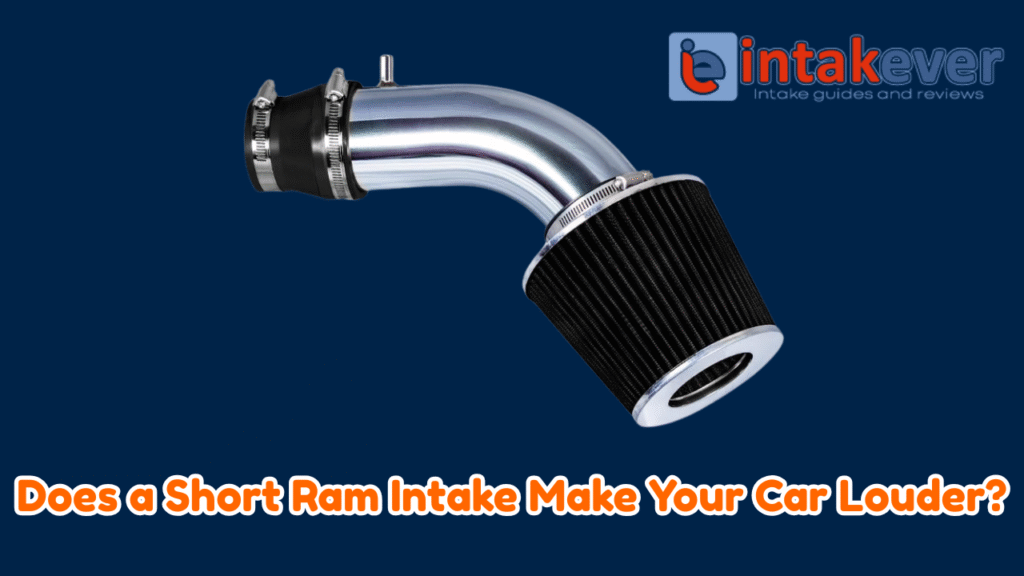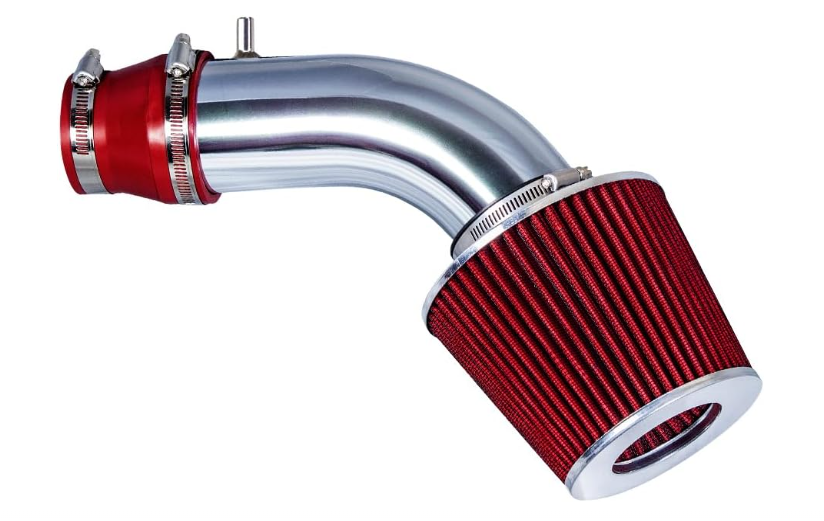We may earn commission from links on this page at no extra cost to you. We only recommend products we back!
Does a short ram intake make your car louder? Yes, it does. A short ram intake amplifies engine noise, especially at higher RPMs, due to its open filter and reduced air intake path.
Does a short ram intake make your car louder? This question has been a topic of discussion among car enthusiasts and those looking to upgrade their vehicle’s performance. While short ram intakes (SRI) are primarily designed to improve engine performance by reducing air intake restrictions, many people also wonder if they make their car sound louder. The short answer is yes, but there’s more to it than just that.
In this comprehensive guide, we will explore how short ram intakes impact engine sound, how they differ from other intake systems, and the pros and cons of adding one to the vehicle. Additionally, we’ll delve into the mechanics of how a short ram intake functions, compare it to cold air intakes, and address some common questions regarding their effect on car noise.

What is a Short Ram Intake?
A short ram intake is a type of aftermarket air intake system used to replace the stock intake system in a car. Unlike stock systems, which are designed to reduce engine noise and air intake temperature, a short ram intake typically features a much shorter pipe that leads directly to an open-air filter placed closer to the engine.
The primary purpose of a short ram intake is to increase the flow of air into the engine, which can improve throttle response and increase horsepower in some cases.
Key Features of Short Ram Intakes
Short ram intakes are designed to provide improved airflow to the engine, but they also have distinct features that influence both performance and sound. In this section, we’ll break down the main components of short ram intakes and how they contribute to making the car louder.
- Shorter, Direct Pathway: Short ram intakes reduce the length of the air intake pipe, providing a more direct path for air to reach the engine.
- Open-Element Filter: Instead of a closed airbox, SRIs use an open-element filter that allows more air to enter the engine without as much sound reduction.
- Material Choices: SRIs are often made from materials like aluminum, stainless steel, or high-quality plastics, which may resonate differently and amplify sound.
Does a Short Ram Intake Make Your Car Louder?
A short ram intake is known to change the sound of the car’s engine, often making it louder and more aggressive. In this section, we’ll explore how and why this happens, as well as the factors that influence the volume of the engine sound when installing an SRI.
The Sound of a Short Ram Intake
One of the most noticeable effects of installing a short ram intake is the change in engine sound. Short ram intake make a car louder. Here’s why:
- More Airflow = More Sound: With a short ram intake, the air travels through a shorter and less restrictive path, which allows for a greater volume of air to enter the engine. As more air is pulled into the intake, the engine noise, particularly the intake noise, becomes more pronounced.
- Open-Element Filter: The open-element design of SRIs contributes significantly to the increased sound levels. Stock airboxes are designed to reduce noise, often incorporating sound-deadening materials to keep the engine’s intake noise quieter. SRIs, however, use an open filter, which means more of the air entering the engine is audible.
- Frequency and Tone of the Sound: The sound produced by a short ram intake is often described as a louder, more aggressive intake noise, especially when you accelerate or hit higher RPMs. It can create a throaty or growling sound that many car enthusiasts find desirable.
- Engine Speed Impact: At low RPMs, the change in sound may not be as noticeable, but as you accelerate and reach higher RPMs, the difference becomes clear. The intake sound becomes more pronounced and aggressive, adding to the overall engine note.
Comparison to Stock Intakes
Stock intake systems are engineered to minimize engine noise and provide a smooth and quiet driving experience. In contrast, short ram intakes are built with performance in mind, and as a result, they tend to make the car louder.
When compared to a factory intake, a short ram intake creates a more noticeable intake sound, especially during acceleration. This makes SRIs particularly popular for those who want a sportier, more aggressive engine sound without making other major modifications to their vehicle. Read more about Is Short Ram Intake Better Than Stock?

Short Ram Intake vs. Cold Air Intake: Which Is Louder?
While both short ram intakes and cold air intakes (CAIs) are designed to improve engine performance, they differ significantly in how they affect engine noise.
Short Ram Intake (SRI)
- Sound: Generally produces a louder, more aggressive intake sound, especially at higher RPMs.
- Design: Shorter intake pipe and an open-element filter.
- Performance: May increase intake temperature, which can slightly reduce performance gains.
- Ideal For: Those looking for a noticeable engine sound change without making the vehicle too loud at idle.
Cold Air Intake (CAI)
- Sound: Tends to be quieter at idle and lower RPMs but can produce a deep growl at higher RPMs.
- Design: Longer intake pipe, often positioned lower in the vehicle to pull in cooler air from outside.
- Performance: Typically provides better performance gains due to cooler air entering the engine, improving combustion efficiency.
- Ideal For: Those seeking a more subtle sound while still gaining performance benefits.
- Key Differences in Sound:
- Short Ram Intakes: Produce a more noticeable increase in sound due to their direct airflow and open filter design.
- Cold Air Intakes: While CAIs provide better performance at higher RPMs, they tend to be quieter at lower RPMs and idle, offering a more refined growl at high speeds.
Factors That Influence How Loud a Short Ram Intake Will Make Your Car
Several factors determine how much louder your car will be with a short ram intake. These factors include:
1. Vehicle Model and Engine Type
Some vehicles are naturally louder due to their engine configurations (e.g., V6 or turbocharged engines), and adding a short ram intake may amplify those natural sounds. On the other hand, smaller engines may exhibit a less noticeable increase in noise.
2. Intake Design and Quality
The materials used in the intake can affect the sound. For example, aluminum intakes tend to amplify intake noise more than plastic intakes, which might absorb sound.
3. Intake Placement and Filters
The placement of the intake and the type of filter used can influence the level of sound produced. An SRI placed closer to the engine will likely amplify engine noise, while one that’s more isolated might not make as much of an impact.
4. Exhaust System
If the car already has an aftermarket exhaust system, the combination of a louder intake and exhaust can produce an overall more aggressive engine note.
Frequently Asked Questions
Here are some FAQs about short ram intake sound –
1. How does a short ram intake affect engine sound?
The short ram intake allows more air to enter the engine with less restriction, amplifying the intake noise, especially during acceleration.
2. Is a short ram intake louder than a cold air intake?
Yes, a short ram intake generally produces a louder, more aggressive intake sound compared to a cold air intake, especially during high RPMs.
3. Can a short ram intake make my car sound like a sports car?
Yes, a short ram intake can make your car sound more like a performance vehicle due to its increased intake noise, making it popular among enthusiasts.
4. Will a short ram intake improve my car’s performance?
A short ram intake can improve throttle response and potentially provide minor horsepower gains, though its impact on overall engine performance is usually less than that of a cold air intake.
Conclusion
In conclusion, does a short ram intake make your car louder? Yes, a short ram intake is designed to amplify engine noise, making your car sound more aggressive and sporty. While the primary benefit of an SRI is improved throttle response and engine performance, the increase in sound is a major draw for many car enthusiasts.
However, the louder noise may not be desirable for everyone, especially those who prefer a quieter ride. Whether or not to install an SRI depends on your personal preference for sound, performance, and your vehicle’s specific needs.
Amazon and the Amazon logo are trademarks of Amazon.com, Inc, or its affiliates.
Leave a Reply